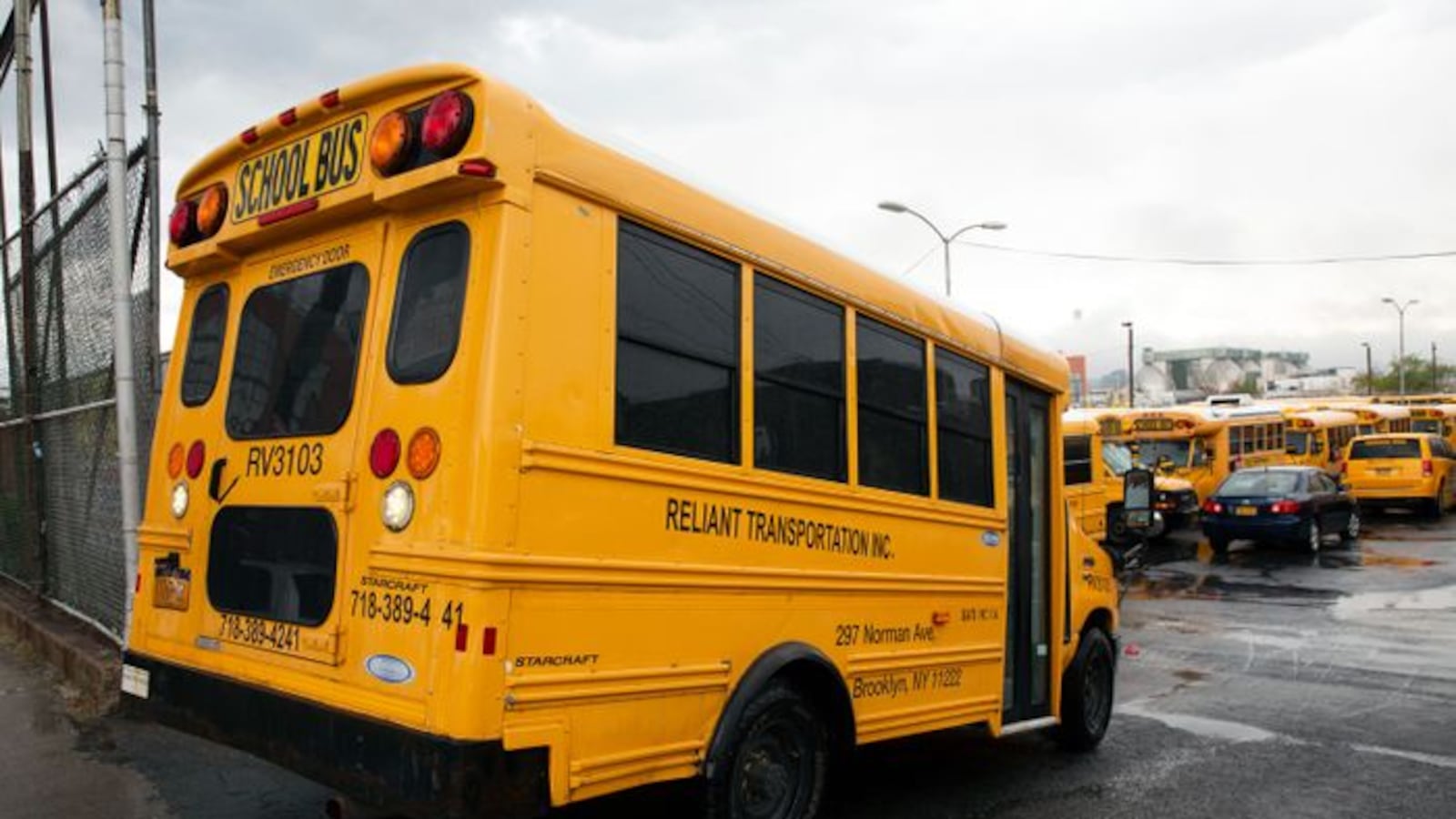
This story was originally published on April 29 by THE CITY.
Some city yellow school bus drivers are vowing to strike for seniority, wage and benefit protections — and this time, management is rallying by their side.
Amalgamated Transit Union Local 1181 and Reliant Bus Company are demanding a change in state law to guarantee the protections on city taxpayers’ dime. So is Mayor Bill de Blasio, who promised the aid in his 2013 campaign, only to be thwarted in court.
A strike would affect about 12,000 special-needs children and 910 school bus routes — dangling a threat over students’ families and the lawmakers who represent them in Albany.
“We’re trying to get the governor and the legislators in Albany to understand the importance of this on working people and safety for children,” Local 1181 President Michael Cordiello told THE CITY.
The roughly 2,000 union members at Reliant voted earlier this month to authorize a strike after a year-long contract negotiations reached an impasse, Cordiello said. That followed a failed attempt at getting a legislative fix into the state budget passed April 1.
Local 1181 wants to require companies awarded new routes to hire veteran drivers and attendants based on seniority and guarantee them their previous wages and benefits — boosts employees at some other bus outfits receive.
But a December decision by state appellate judges upholding 2018 and 2011 rulings nixing these so-called employee protection provisions ties Reliant’s hands. So they’re turning to the state Legislature to reinstate the once-standard protections for new contracts with the city Department of Education.
“We want to provide our workers with raises and competitive benefits, but unless the state restores [employee protection provisions] and reinstates these labor protections for the benefit of the entire industry, we fear we will continue to remain far apart on a contract with the union,” Jeff Womack, a Reliant spokesperson, said in a statement. “The state has an opportunity to end an historic injustice for workers, restore stability to the industry, and prevent a school bus worker strike by passing…legislation this spring.”
A Spending Game
Reliant seized the opportunity to expand its New York City yellow bus business when then-Mayor Michael Bloomberg rebid some contracts in 2013, sans employee protections. The company has proved an ally of de Blasio’s quest for a change in state law, spending heavily on lobbying and campaign contributions.
Alexis Lodde, a founder and owner of Reliant’s Dallas-based parent company, MV Transportation, donated $100,000 to the Putnam County Democratic Committee in 2014, as de Blasio and associates pressed for financial support for upstate Democrats in an unsuccessful bid to win party control of the state Senate.
Reliant and its parent company also spent some $977,000 on state and city lobbying efforts related to employee protection provisions between 2015 and 2018, according to state records — far more than other bus companies.
Between 2014 and 2018, the City Council approved $136 million in supplemental funding to pay for the driver protections, according to the Citizens Budget Commission — all going to employees of Reliant.
A Legislative Fix?
With the Senate, as well as the Assembly, now in Democratic Party control, a handful of first-year state senators introduced a bill earlier this month that would require city school bus contracts to contain employee benefit protections and hiring preferences.
It would codify the protections into state law and create an exemption to the prevailing requirement that contracts be awarded to the “lowest possible bidder” — unless it can be proven a proposed alternative saves money.
The measure explicitly says the city’s Department of Education would have to shoulder the additional cost, whose total is up for debate.
Supporters say it would run the city an additional $35 million annually to include employee benefits in all school bus contracts.
Competitors to Reliant say the price tag could hit north of $200 million annually if all the contracts for school routes had employee benefit protections. The city Office of Management and Budget did not provide an estimate for how much the legislation would cost taxpayers.
State Sen. John Liu (D-Queens), a former city comptroller who pledged to restore employee protections while running for mayor in 2013, said that spending should be “viewed through the prism” of the city’s $1.2 billion a year school bus system.
“New York City can afford it,” said Sen. Robert Jackson (D-Manhattan), the bill’s sponsor, citing the city’s $92.5 billion budget.
Gov. Andrew Cuomo vetoed similar legislation in 2016, citing a 2011 decision by the state’s highest court, which found that including employee protections in school transportation contracts violated state bidding requirements by raising costs and discouraging competition.
The governor’s office estimated at the time that adding employee protections would cost the state $22 million annually, and run the city an additional $42 million a year.
“As we said during previous efforts, any issue with this significant a fiscal impact should be debated as part of the budget process,” said Rich Azzopardi, a senior advisor to the governor. “Also, this is actually a city, not a state, funding issue and we will continue to discuss a resolution with all relevant stakeholders.”
This story was originally published by THE CITY, an independent, nonprofit news organization dedicated to hard-hitting reporting that serves the people of New York.

